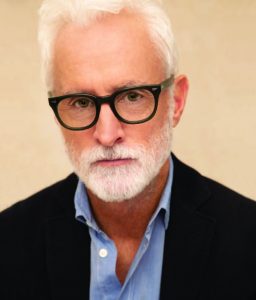
Fox Broadcasting Company
There is an art to delivering a scripted line and John Slattery has all but mastered it. When his characters speak, we not only listen. We want to know everything about them. As Roger Sterling on Mad Men, he offered a window into the brand-building culture of 1960s America and, as Paul LeBlanc in the new Fox series neXt, he is our guide to the chilling prospect of artificial intelligence run amok. Gerry Strauss was curious about the origin of Slattery’s talent for boiling down big television and film concepts into elegant, intimate and often funny moments. Not surprisingly, it was honed live on stage.
EDGE: What drew you to acting as a young man?
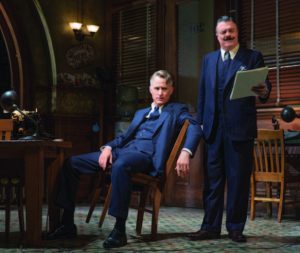
Broadway.com
JS: I watched a lot of movies and TV when I was a kid and, somewhere in there, I realized that people were actually doing this as a job…and maybe I could do that. I had to apply to college somewhere and there was a school—Catholic University in Washington, DC—that my sister had gone to. I was not a very good student and my options were probably not that great. It was the only place I applied. If I didn’t get in there, I was going to have to figure something else out. I got in and they had a theater department, so that’s how I started.
EDGE: Your stage résumé is very extensive. Do you actively pursue theater work in between your television and film projects?
JS: Absolutely. One of my favorite things is to be able to do various disciplines. There are different rhythms to all of them. When I went to New York, my first legit jobs were commercials and stuff like that—which are great jobs to have and you learn a lot. But as far as acting, I learned on the stage. It’s thrilling and difficult in a different kind of way. It tests you and your ability to repeat the whole process every night and rehearse for a sustained period of time. So it’s just completely different than anything involving a camera. Hopefully, that is something that people will still be able to do.
EDGE: How did John Slattery become Roger Sterling?
JS: Matt Weiner saw me in a play. I was doing Rabbit Hole on Broadway with Cynthia Nixon and Tyne Daly. I went in to read for the part of Don Draper; that’s because the part of Roger didn’t have a lot to do in the pilot. And then, after I read a couple different times and did my homework and prepared, he said, “Well, here’s the thing…[laughs]…we have that guy already.” That actually happened. Matt claims that I was in a bad mood the whole time we shot the pilot because I didn’t think that my part was good enough, and my nose was out of joint because he made me read for Don Draper.
EDGE: Were you in a bad mood?
JS: I don’t know. But I probably had one foot out the door, because no one knew what Mad Men was going to turn out to be, since AMC hadn’t done very much original programming. Anyway, Matt promised me it would be a great part…and it was.
EDGE: When the series concluded, were you concerned that future projects might not meet the untouchable quality standards that you’d become accustomed to as a part of that show?
JS: No, not even a little bit. I’m not looking for Mad Men. I’ve done that and I had a great time doing it. I never expected it to happen in the first place, and I don’t expect it to happen again. That said, I went on and did Spotlight, which was pretty great—great circumstance, great people. I just try to find the material that speaks to me. Sometimes it works out and sometimes it doesn’t. But that’s okay, too. If you can find something that satisfies you, then I’m good with that.
EDGE: You’ve played a lot of bosses and high-ranking employees. Does each take a particular kind of preparation?
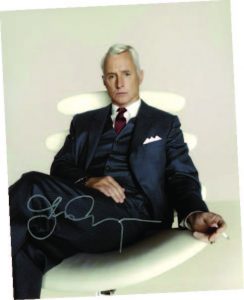
Upper Case Editorial
JS: I’ll do my research, the required homework in order to make myself as convincing as possible. But people are in positions of authority for all kinds of reasons, whether they know their job, or whether they they’re just good with people, or whether their brother-in-law runs the company. For example, in Mad Men, I played a guy whose name is on the building, but it’s because his father founded the company. However, If you said that to him, he’d say, “What does that have to do with anything? Are you trying to tell me that I don’t know how to do my job?” There isn’t any one quality that is required to have that job.
EDGE: neXt has been quite the addition to Fox’s lineup this season. What appealed to you about the concept of the show?
JS: The character appealed to me because this guy created this artificial intelligence, and he immediately recognizes the potential dangers of and tries to lock it away. In his absence, it’s unlocked and plugged into the internet and it starts to run amok, and he’s trying to warn people how dangerous it is. I was interested in exploring how do you describe exponential growth and tell someone the planet’s burning? So he’s trying to describe to people how super intelligence works and why it’s dangerous. You give this thing an order on Friday and over the weekend it learns the 20,000 years of human history—you think it might take issue with you being its boss on Monday morning? I say a line in the show—“You know, in your lifetime, you’ll kill maybe 100,000 bugs with your car. You don’t mean to…they’re just in the way. That’s what we are to this thing.”
EDGE: People look at your character Paul like he’s crazy.
JS: Because he is kind of crazy. He has this brain disease, and he’s hallucinating and he’s paranoid and he’s anxious. People are put off by him and don’t really want to listen to what he has to say. So it’s that combination that made the whole role a really interesting exercise—and makes it a thrilling show. You asked the question about how I approach playing people in positions of authority? So I don’t know anything about super intelligence. I read a couple of books and watched Sam Harris give a couple of lectures. I listened to Elon Musk and Bill Gates trying to explain it. You go So how do I do that? I had to learn how to get my mouth around some of the technical terms that that need to be second nature to my character and I have to communicate with a degree of authority—as well as an off-handed quality—that really smart people have [laughs].
EDGE: With so much streaming content that gets binged and forgotten until a new season drops, do you think there is a benefit to having series like neXt air one episode a week—so that suspense builds, storylines develop and buzz gets generated?
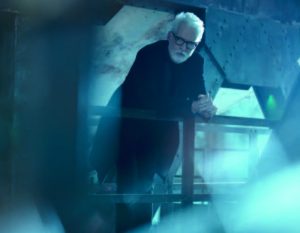
Fox Broadcasting Company
JS: It’s a good question. I just finished watching a show called The Bureau. It’s a French spy show. They had already made four seasons of it, so I binged four seasons of it. I thought there were five and was expecting to watch the fifth next, and then I realized that the new season hadn’t come out yet. Then, the fifth season was on week to week [laughs] so I had to watch the thing every week and wait for them one at a time. I was kind of pissed in the beginning, but it didn’t keep me from turning it on. You can binge something and you can crank through the story in a couple of days, which is great. But there still is that anticipation if you know how to hook the audience. You’ve got to have a good couple of shows up top, kicking the thing off and setting the hook as it were to the audience—which I think we do. You’re not trying to manipulate anybody, but you’re trying to get them interested in the story you’re telling. There’s so much entertainment out there, and people’s lives are so filled with media of one kind or another, that it’s hard to make a dent. I think this show does. I really do. And I think it’s more timely now than when we made it six months ago.
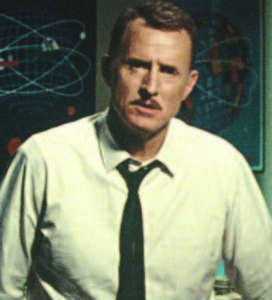
Marvel Studios
Iron Man’s Dad
Fans of the Marvel Cinematic Universe know John Slattery as Howard Stark, Tony Stark’s father, a character presented in flashbacks since he was murdered before the current-day setting. How did John land this role?
I wasn’t a big comic book fan—not since I was a kid, so I really didn’t have that much of a pull towards it. I got a call from Jon Favreau, who directed the first two Iron Man movies. “Do you have any children?” I said, “Yeah…”, and he said, “You have to do this then. I mean, how are you going to tell your kid that you had a chance to play Howard Stark and you turned it down?”
When I did scenes with Robert Downey, there’s a script and we rehearse it and then we change it. It wasn’t like a total improv, but there was a lot of stuff that we were just trying to figure out. You have to figure out the best way to tell the story of the film and try to figure out where the scene lives. It was really fun to do that with Downey and the Russo brothers, who are such smart guys.

Amazon Studios/Prime Video
The Spice of Life
Is it fun for you to pop into an episode of The Romanoffs or a film role that doesn’t involve a long-term commitment?
Yeah! Variety is part of the reason I went into this business. You can play different people and learn to do a variety of different jobs, but you don’t have to actually stick with them. Sometimes the short assignment can be preferable, depending on where my life is at the moment. Sometimes it’s tricky because you don’t have as much information about the story to go on. Then again, you have to remember that because a show like Mad Men happens one scene at a time, so you don’t really know a character in its entirety until you get to the end.










